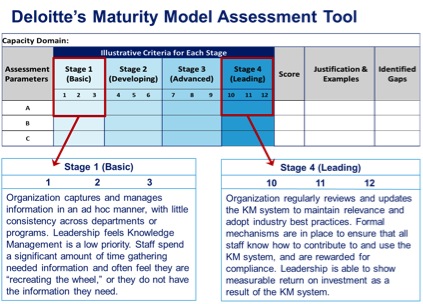Benchmarking Organizational Capabilities: Where to Begin?
June 30th, 2015
NTD Program Management and Sustainable Impact
Experience has shown that developing a Neglected Tropical Diseases (NTD) finance strategy that’s aligned with the country’s NTD Master Plan strengthens the latter and has a sustained, measurable impact. But effective finance strategies don’t happen overnight! Devising one requires a solid understanding of organizational capabilities as they related to performance. In other words, NTD program managers and team members must know what the organization needs to do to reach its current and future NTD programming goals.
In Ghana, the END in Africa project has helped the Ghana Health Service (GHS) NTD Program (NTDP) team identify organizational capabilities needed to meet the performance metrics that the NTDP had prioritized through an organizational maturity model exercise. Participating in this exercise allowed the NTDP team to assess its performance against leading edge organizational characteristics and identify gaps that need to be addressed to reach the team’s shared vision of NTD control and elimination.
To start the process, Dr. Nana-Kwadwo Biritwum, Ghana’s NTD Program Manager, and Mustapha Hamidu Adams, the GHS’ Deputy Director of Finance, devised a list of capacity domains that directly affect the organization’s ability to achieve its NTD performance goals. The final list included eight domains – strategy and execution, leadership and team dynamics, finance, governance, policy and processes, talent and people, transaction performance and financial control documentation.
The END in Africa team then created a tailored maturity model covering the prioritized domains, which was used to facilitate a capacity building event with 15 finance and technical staff members from the national and regional levels of the GHS’ NTDP. Participants walked through more than 50 parameters in two groups, reviewing descriptions of the maturity stages across the domains, discussing the NTDP’s current status in each domain, and scoring each on a scale of 1-12, with “1” representing basic capability, and “12” representing leadership. Descriptions of the maturity stages were based on organizational development and financial management standards developed by Deloitte Consulting LLP (see the table for an example of the model).
The groups documented their discussion and their reasons for their agreed-upon score. Once all of the parameter reviews were complete, the participants reconvened and each group presented its assessment.
This process enabled the NTD team to generate consensus on the ratings and formed the basis of a final baseline assessment. It also enabled the team to create a Performance Achievement Action Plan, and to prioritize next steps toward improving NTDP organizational performance.
Participant feedback indicated that the event helped the NTDP reach consensus on critical aspects of performance improvement through:
- Leadership engagement for NTD process improvements: In addition to the NTDP Program Manager and GHS Deputy Director of Finance, Ben Sekyi-Saakwa, Head of Finance of the GHS Disease Control Unit of the Public Health Directorate, participated in the event, demonstrating leadership buy-in and commitment to advancing the Action Plan.
- Team-building: Bringing NTDP stakeholders together from across the organization enabled vibrant discussion and problem-solving to strengthen NTD program performance and implementation.
- Staff motivation and mobilization: The participatory nature of Action Plan development, combined with leadership engagement, generated a sense of personal investment in the Action Plan outcomes and motivated staff to commit to executing the Plan.
- Country-ownership and stewardship: In-country participants drove the process, owning the discussion and designing the Action Plan. They verbalized and demonstrated their ongoing commitment to action.
The process helped the NTDP team understand the need to develop an NTD finance strategy that is grounded in the organizational realities of Ghana’s NTD Program.
Next month, we’ll share specific steps that can help engage NTDP stakeholders in developing an NTD finance strategy.
For more information on the maturity model, Deloitte has produced an article and video titled “A paradigm for capacity development.”

NTD Program leaders in Ghana used a tailored organizational maturity model to discuss current state of organizational capacity and produce a shared vision for the future of their program. Photo: Deloitte Consulting LLP

